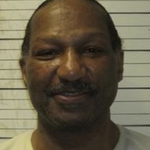
Byron Black
Image from TDOC.
On July 18, 2025, the Davidson County Chancery Court issued a preliminary injunction requiring the Tennessee Department of Corrections (TDOC) to ensure that Byron Black’s implanted heart device (cardiac implantable electronic device, or CIED) is switched off just ahead of his execution by a cardiac specialist or qualified technician working under such supervision. In June 2025, counsel for Mr. Black filed a motion for a preliminary injunction, explaining that because of his CIED, he faces a severe risk of a “prolonged” and “torturous” execution, as the lethal injection drugs can trigger the emergency function of the CIED to shock his heart repeatedly, attempting to restore a normal heartbeat. Attorneys for the state argued that the CIED’s emergency function creates neither a risk of a “prolonged” nor “torturous” execution.
In his order, Chancellor Russell T. Perkins agreed with Mr. Black’s attorneys that he faces the “risk of irreparable harm if his CIED device is not deactivated.” The order goes on to note that “This risk can be completely avoided by deactivating Mr. Black’s CIED device shortly before or at the point of administrating the lethal injection” and that doing so would not pose “any undue administrative or logistical burden…on the State.” Mr. Black is scheduled for execution on August 5, 2025, even though state experts have recognized his intellectual disability, and he suffers from severe dementia, significant brain injury, heart failure, and terminal kidney disease.
In response to Chancellor Perkins’ ruling, the state told the court they could not locate a medical professional willing and qualified to turn off Mr. Black’s CIED in the execution chamber at the time of the execution, but they could do so ahead of the execution. During a hearing on July 22, Tennessee Deputy Attorney General Cody Brandon said Mr. Black’s physicians were unwilling to go to the execution chamber and asked Chancellor Perkins to overturn his order or to allow TDOC to bring Mr. Black to the hospital for deactivation of his CIED the day before his scheduled execution. Kelley Henry, Mr. Black’s attorney, told the court she alerted TDOC of her concerns with Mr. Black’s CIED in early June, but it was not until the issuance of Chancellor Perkins’ July 18 order that they started to search for a doctor willing to disable the CIED.
Following the hearing, Chancellor Perkins modified his order, allowing TDOC to deactivate Mr. Black’s CIED as early as the morning of his scheduled execution, at Nashville General Hospital. He noted in his ruling that a doctor who testified for Mr. Black said deactivating the CIED does not require surgery, only a handheld device. Chancellor Perkins also noted Mr. Black may not be forced to consent to the deactivation of his CIED, as it creates the risk that his heart will go into failure while a stay or reprieve could be issued.
Mr. Black has also filed a clemency application, asking Governor Bill Lee to commute his death sentence to life imprisonment without parole to ensure his execution does not violate the Constitution. Every expert that has met with and examined Mr. Black has agreed he is a person with intellectual disability, and thus, is ineligible for the death penalty under the 2002 U.S. Supreme Court ruling in Atkins v. Virginia. In 2022, the Davidson County District Attorney agreed that Mr. Black has intellectual disability; however, the courts have refused to consider the state’s finding because of a procedural barrier. In 2021, Tennessee lawmakers passed legislation providing death row prisoners with the opportunity to have a hearing to consider claims of intellectual disability. Mr. Black sought a hearing under this new legislation and at that time, the state’s expert concluded Mr. Black is a person with intellectual disability. Despite the expert’s findings, the court refused to allow a hearing for Mr. Black, reasoning that he already had a hearing regarding his intellectual disability claim two decades earlier, before the new law was enacted.
“Clemency exists for situations like this, where the courts are unable or willing to prevent a gross injustice…Even the Attorney General acknowledges that but for Byron’s own diligence in raising his claim decades ago, he would be entitled to a hearing under prevailing medical and legal standards now.”
According to the clemency petition, “If the execution is allowed to move forward, Byron Black would be the first intellectually disabled person executed by Tennessee in the modern era of the death penalty.” The petition also notes that Mr. Black is the only person on Tennessee’s death row who has been denied the benefits of the 2021 legislation simply because he diligently pursued intellectual disability claims earlier, based on now outdated and invalid medical and scientific conclusions. Because of his earlier diligence, “Mr. Black finds himself in a constitutional catch-22: “He did everything right. And because he did, he stands to be executed because the courts cannot find a home for his claim.”
Steven Hale, Everyone Agreed Byron Black is Intellectually Disabled; Tennessee Will Execute Him Anyway, Nashville Banner, July 23, 2025; Travis Loller, Tennessee judge gives state leeway on deactivating inmate’s heart-regulating device before execution, Associated Press, July 22, 2025.


